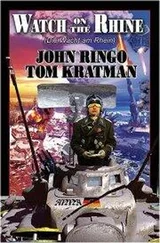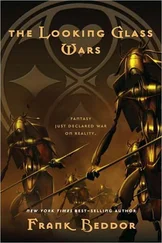“Juliet Five-Four, this is Sierra One-one,” Task Force Command said. “Stand by. We’re awaiting word from the Lima Eight-Six units that they’re in place.”
“Fucking One-Oh-One,” the colonel bitched. “They think they’re so hot shit and here we sit waiting on them.”
“I dunno, sir,” his S-3 opined. “Them ridges are a bastard. I hunt in country like this and making that movement, stealthily, in three hours? I would have been awfully surprised.”
* * *
It had been a total bastard of a march.
The distance wasn’t far, no more than three miles in direct line, but they hadn’t taken a direct line. The guide from the Kentucky unit was a short, broad young sergeant, dark hair covered by a floppy “boonie” cap and a dark growth of beard apparent in a five o’clock shadow. He had led them up and down hills, across streams and along knife-edge ridgelines, never in one direction for very long.
Bill was glad that the Mark Two had more maneuverability, otherwise the march would have been impossible. It was necessary at times for the mechas to walk one foot in front of the other, something impossible with the Mark One. And while they were not holding up the advance, they definitely didn’t feel slowed by the soldiers in front of them; it was all the clumsy mechas could do to keep up with the pace.
But the unit had stopped, all of the soldiers dropping to a squat and facing outward for threats as the colonel held the radio and talked to someone.
Bill kicked in his external directional mike and shamelessly eavesdropped as the Kentucky scout came back down the line and squatted by the battalion commander.
“Honest to God, sir,” the scout said. “They wasn’t there five hours ago.”
“Picket,” Miller said over the radio. They SEALs had been training with the essentially effortless suits for two weeks and he’d learned some of the ins and outs, too. Like the directional mike. “The Mreee have a picket up on our line of march.”
“What do we do?” Bill asked as the colonel shook his head and looked at his map.
“Take it out,” Miller replied, stepping forward in a crouch. “Excuse, me, Colonel.”
“Yes, Master Chief,” the colonel said, clearly annoyed.
“Sir, taking out sentries is our specialty,” Miller pointed out, ignoring the fact that the colonel had missed the “command” part.
“I don’t think that, despite your wonderful camouflage job, you can exactly sneak up on these Mreee,” the colonel said, sarcastically. The suits were well camouflaged, visually, but even with the enhancements they were as noisy as a platoon of regular infantry.
“I wasn’t planning on using the suit, sir,” the SEAL said, politely. He turned and made a series of hand gestures towards the other SEALs, who were down on their knees and elbows to reduce their visibility. One of the suits sat up and kneeled, opening along the front. The SEAL within stepped out and around the suit, opening up a side-panel on the ammunition storage box. From it he extracted a silenced M-4, a black balaclava, a combat harness and a camouflage “ghillie” suit made, like those over the suits, of netting strung with soft colored cloth. In a moment he was suited up and soft footed over to Miller’s position. Bill noticed that he was wearing what appeared to be dyed black moccasins.
“Russell is our team sniper, sir,” the command master chief said. “The wind is towards us. He can take down the picket and no one the wiser.”
The colonel looked at the two SEALs and shook his head.
“Sorry, Chief,” the colonel said. “I should have known you weren’t an idiot. Go.”
Russell looked at the scout and then gestured with his chin towards the front of the battalion.
Bill dialed up the directional mike and followed them out of sight. He could hear the scout moving quietly through the underbrush along the ridgeline, but not a sound from the sniper despite the encumbering camouflage. He waited what seemed an interminable period and then heard two muted cracks, something like firecrackers that had been placed under a jar.
“They’re down,” the colonel said. “They didn’t appear to have a radio or any other communications devices.”
Bill wondered about that, thinking about the Adar and their implants. But the Mreee really did seem to be a relatively low-tech race that had somehow acquired a set of high tech implements. The battalion started moving again but the suits had to wait while Russell made his way back. The SEAL quickly trotted into view, though, and stowed his dismount gear, suited up and they were on their way.
As they passed the two Mreee bodies, Weaver wondered what they had thought, sent to an alien land by their allies? Their masters? Set up on a hilltop that was unlike anything from their home world. What were they thinking? Were they hoping to go home, alive, to their mates? To their littermates? Or were they looking forward to killing the humans?
He also wondered what the soldiers thought at a time like this. He had never even considered joining the military; he had nothing against it but science had been his passion since an early age. What was Russell feeling? Did he have any feelings about killing the child-sized felinoids at all?
He remembered the expression on the SEAL’s face as the balaclava had been taken off and he stowed his gear. Cold, clear, professionally interested in getting his gear away and back on track as swiftly and efficiently as possible. What drove these human killing machines?
Bosons made more sense.
The sun had set and away from city lights there was limited visibility. All the troopers of the 101st, though, had flip-down monoculars on their helmets and the reduced lighting seemed to affect them not at all. The suits, of course, had night vision systems and they could see, if not as clearly as day then clearly enough. They even had thermal imaging systems and Bill flipped them on to get a look at how it felt in a real mission. The soldiers ahead of him were white ghosts and the overall impression was, if anything, worse than with the night vision systems. He quickly switched back.
The battalion reached its first phaseline, Highway 541, and spread out to either side, probing for Mreee sentries. They found none. The lone picket on the hilltop seemed to be the only force the Mreee had out on this wing. As soon as everyone was in position, the colonel sent the code word and the whole battalion, plus the mecha, swiftly crossed the road and settled into the woods on the far side. They were within a mile or so of the gate and still seemed to have been undetected.
The colonel spoke into his radio and then waved the battalion down; now was the time to wait. Bill turned up his external audio to listen to the night. There was the sound of an owl, unaware that the planet had been invaded by aliens, calling forlornly for a mate. A cough. A slight rattle of equipment from down the line. Then, in the distance, a sound of firing that rose to a crescendo, quickly. A shattering explosion. Then, more firing, closer.
The colonel still waited, monitoring his radio. Bill looked at his suit clock and noted that the bomb should have fully cooked by now; it had taken that long to get into position. But there was only one ridge between them and the gate. The firing to the south and the west was joined by more to the north and there was a brief flash of actinic fire to the south that lit the crouched infantry for a moment like day. Finally the colonel stood up, saying something on his radio. There was a rustle from either side as the battalion began to move up the steep slope.
Still, as they moved, nothing. Then, from the north, there came the sound of a fusillade of shots and a ball of plasma lit the air.
Contact.
Читать дальше










